Annual
Meeting of Euro Kids Network Members
Como, 16 and 17 October
1999
The annual
meeting of exhibitors belonging to Euro Kids Network
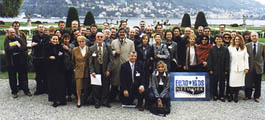 The
meeting was opened by Romano Fattorossi, President of MEDIA Salles, and
by Elisabetta Brunella, Secretary General, who presented the circuit and
outlined its plans for development over the next few years. Euro Kids Network
is the initiative created by MEDIA Salles to consolidate and develop the
"cinema at the cinema" offer for children and young people in Europe and
to encourage contact between younger audiences and the European exhibiting
theatres. The circuit supports and unites theatres committed to programming
films for children and young people and/or for schools, with particular
attention to audiovisual works of a European origin.
The
meeting was opened by Romano Fattorossi, President of MEDIA Salles, and
by Elisabetta Brunella, Secretary General, who presented the circuit and
outlined its plans for development over the next few years. Euro Kids Network
is the initiative created by MEDIA Salles to consolidate and develop the
"cinema at the cinema" offer for children and young people in Europe and
to encourage contact between younger audiences and the European exhibiting
theatres. The circuit supports and unites theatres committed to programming
films for children and young people and/or for schools, with particular
attention to audiovisual works of a European origin.
MEDIA Salles has established
the objective of creating the audiences of tomorrow, of increasing the
opportunities for children and youngsters to see European films, and of
grasping the various aspects of Europe’s culture and identity, of supporting
professional players and the exhibiting companies involved in the field,
encouraging a wide and varied offer, and of encouraging relationships between
institutions and the market, as well as between industry and society at
a European level.
In 1999 the circuit has grown
to include over 337 screens distributed over 16 European countries.
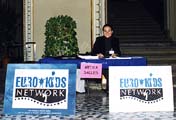 Now
at its fourth edition, the annual meeting is an important occasion for
exhibitors to meet and compare notes: some of the more significant experiences
of belonging to the circuit are shared, in order to provide useful tools
for activities offered by cinemas to younger audiences.
Now
at its fourth edition, the annual meeting is an important occasion for
exhibitors to meet and compare notes: some of the more significant experiences
of belonging to the circuit are shared, in order to provide useful tools
for activities offered by cinemas to younger audiences.
The meeting saw contributions
from exhibitors from various different countries, such as Italy, Spain,
Finland and the United Kingdom, on the issues relating to modern cinema,
seen not only as an "industry" but also as a tool for educational initiative
and as a meeting place.
Amongst the speakers, Silvio
Luttazi, from the "Nuovo Teatro" cinema of Palombara Sabina (Rome),
illustrated the "Schools Festival" initiative, organised in collaboration
with AGISCUOLA and the schools in the District. By planning screenings
for students from primary, middle and high schools and organising meetings
with actors and directors, the festival not only places the cinema alongside
more traditional tools of education, but also encourages experimentation
in film-making, giving precedence to works by new directors and asking
a jury of young spectators to decide on the director who best distinguishes
her-/himself in the search for a new language of expression.
Jérome
Sage, from the "Alcampo Multicines", "Alameda Multicines" and "Multicines
Los Arcos" cinemas of Seville (Spain), presented the "El Aule de Cine"
initiative which, in collaboration with schools, gives young people the
chance of getting to know the history of the cinema and the different phases
by which a film is made, with an approach to the particular nature of the
language of the cinema, discovering its fictional side and the tricks of
the trade.
Pentti
Kejonen from the "Studio" cinema of Oulu (Finland) emphasised how collaboration
with schools and the organisation of film festivals for young people could
become a promotional strategy, creating a channel of information on films
which would be an alternative to that offered by the television.
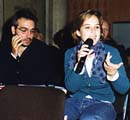 McIntyre,
an English exhibitor from the "Metro" cinema in Derby (UK), presented the
initiative for young people with hearing disabilities, which envisages
two-monthly screenings accompanied by sign language, in collaboration with
the school for the deaf in Derby and other, connected, groups.
McIntyre,
an English exhibitor from the "Metro" cinema in Derby (UK), presented the
initiative for young people with hearing disabilities, which envisages
two-monthly screenings accompanied by sign language, in collaboration with
the school for the deaf in Derby and other, connected, groups.
The meeting of Euro Kid Network
members proved extremely useful for the exhibitors, mainly because it gave
them the chance of comparing their situation to others in Europe, exchanging
ideas and opinions and finding partners for the creation of transnational
projects, involving young people from different countries in Europe.
Seminar
organised by MEDIA Salles and ECFA on the distribution of films for young
people in Europe
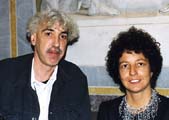 "The
distribution of films for young people" was the theme of the seminar organised
by MEDIA Salles, in collaboration with the ECFA (European Children’s Film
Association) on the afternoon of the 16 October 1999.
"The
distribution of films for young people" was the theme of the seminar organised
by MEDIA Salles, in collaboration with the ECFA (European Children’s Film
Association) on the afternoon of the 16 October 1999.
The desire to plan a series
of films for young people in exhibiting theatres conflicts with the problem
of locating such films on the market. Thanks to the presence of distributors,
sales agents and people responsible for the organisation of film festivals
for young people, the seminar aimed at creating better co-ordination between
those dealing with the circulation of films for youngsters, a product too
often neglected in the traditional dynamics of distribution.
The following people spoke:
Felix Vanginderhuysen, Secretary
General of the ECFA and Film Distributor - Belgium
Dick De Jonge, Sales Agent
- Holland
Reinhold Schoeffel, Film
Distributor - Germany.
The meeting was chaired
by Domenico Lucchini, President of the ECFA.
In order to provide an incentive
and a support for activities and events on behalf of younger people, MEDIA
Salles has set up a section on its own Internet site (http://www.mediasalles.it)
dedicated entirely to initiatives and films for young people: the part
dedicated to educational activities, "Films and Media Education Initiatives
- audiovisual learning tools" offers information on the activities that
MEDIA Salles, or other organisations specifically addressed to younger
audiences, provide for exhibitors and teachers, such as, for example, the
list of Film Festivals for young people and the initiative "The School
adopts a Cinema", promoted in Italy by the Ministry of Education, in collaboration
with AGISCUOLA. MEDIA Salles contributes to the initiative by supplying
on-line information relating to the exhibiting theatres and films involved,
over its own web site, aiding and encouraging contact between schools and
the cinema.
MEDIA Salles also provides
a tool of information, the "European Cinema On-Line Database", which is
an Internet catalogue of recently produced European films and their respective
producers, distributors and exporters, as well as the exhibiting theatres
that dedicate a part of their programming to European titles.
The database includes the
"Euro Kids" section, elaborated in collaboration with the ECFA (European
Children’s Film Association), dedicated to those films and companies that
address younger audiences. For each film included in the Database, the
title is shown in different languages, as well as the technical-artistic
details and commercial data (such as the production company, the distributors,
the foreign sales agent).
During the seminar, Luigi
Codemo demonstrated how to access the "Euro Kids" section, once connected
to the database, and how to find information on films for young people,
from the synopsis or images to the production and distributing companies.
Presentation
of the research study: "Features
and Modes of Cinema-going in Europe - Young People and the Cinema"
On Sunday 17 October 1999
in the Sala Chaplin of Villa Olmo, Como, Paola Bensi, of the Catholic University
of Milan, presented the research study "Features and Modes of Cinema-going
in Europe - Young People and the Cinema", an up-to-date elaboration of
figures and information that MEDIA Salles had collected in the theatres
of the Euro Kids Network circuit throughout Europe, from audiences of young
people up to the age of 25.
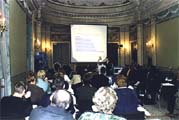 The
study was started in 1996, the year in which the circuit was set up, with
the intention of establishing the nature of cinema-going amongst young
audiences, setting it in the broader context of leisure-time activities,
in order to understand the real interest of young people for a quality
product, closer to European cultural values.
The
study was started in 1996, the year in which the circuit was set up, with
the intention of establishing the nature of cinema-going amongst young
audiences, setting it in the broader context of leisure-time activities,
in order to understand the real interest of young people for a quality
product, closer to European cultural values.
The research shows that 68%
of the almost six thousand young people from 12 different countries, who
answered the questionnaire, declared that they would be interested in seeing
more European films in the future. The young people who showed this interest
are those who go to the cinema more frequently than others of the same
age, who go with their schools and who are more careful and 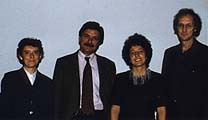 demanding
in their choice of film. To them the cinema means culture and involvement,
so much so that the feature of "cultural offer" - a book shop in the cinema
or other cultural initiatives linked to the shows - is considered important.
Moreover, those who would like to see more European films in the future
are also those who are most interested in initiatives such as "Euro Kids
Network", the circuit that supports and links theatres in 16 European countries
committed to programming films for young people, reserving a special place
for European productions.
demanding
in their choice of film. To them the cinema means culture and involvement,
so much so that the feature of "cultural offer" - a book shop in the cinema
or other cultural initiatives linked to the shows - is considered important.
Moreover, those who would like to see more European films in the future
are also those who are most interested in initiatives such as "Euro Kids
Network", the circuit that supports and links theatres in 16 European countries
committed to programming films for young people, reserving a special place
for European productions.
This research is a continuation
of the study carried out for the event "Europe Meets at the Cinema: a week
for a century of European cinema", held in 1995, the results of which were
published in the volume "L’esigenza di riposizionamento del servizio cinematografico
in Europa", where the author, R. Nelli, analyses the communication strategy
of exhibiting theatres in relation to the spectators’ expectations and
the position of the cinema in the context of leisure-time activities.
Presentation
of the "Euro Kids Network" award to the best European film for children
and young people
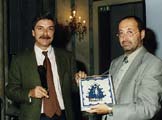 The
17 October at Villa Olmo also saw the presentation of the "Euro Kids Network
Award", which was given to the animated film "Lucky and Zorba", by Enzo
D’Alò, produced by the Cecchi Gori Group, Tiger Cinematografica
and Lanterna Magica, chosen from amongst the films for children and young
people identified by exhibitors as being the most suitable for international
circulation.
The
17 October at Villa Olmo also saw the presentation of the "Euro Kids Network
Award", which was given to the animated film "Lucky and Zorba", by Enzo
D’Alò, produced by the Cecchi Gori Group, Tiger Cinematografica
and Lanterna Magica, chosen from amongst the films for children and young
people identified by exhibitors as being the most suitable for international
circulation.
The award, presented for
the first time, aims to draw the attention of the industry and of European
institutions to the necessity for increasing and supporting the production
and circulation of films destined for younger audiences.
 The
meeting was opened by Romano Fattorossi, President of MEDIA Salles, and
by Elisabetta Brunella, Secretary General, who presented the circuit and
outlined its plans for development over the next few years. Euro Kids Network
is the initiative created by MEDIA Salles to consolidate and develop the
"cinema at the cinema" offer for children and young people in Europe and
to encourage contact between younger audiences and the European exhibiting
theatres. The circuit supports and unites theatres committed to programming
films for children and young people and/or for schools, with particular
attention to audiovisual works of a European origin.
The
meeting was opened by Romano Fattorossi, President of MEDIA Salles, and
by Elisabetta Brunella, Secretary General, who presented the circuit and
outlined its plans for development over the next few years. Euro Kids Network
is the initiative created by MEDIA Salles to consolidate and develop the
"cinema at the cinema" offer for children and young people in Europe and
to encourage contact between younger audiences and the European exhibiting
theatres. The circuit supports and unites theatres committed to programming
films for children and young people and/or for schools, with particular
attention to audiovisual works of a European origin.





